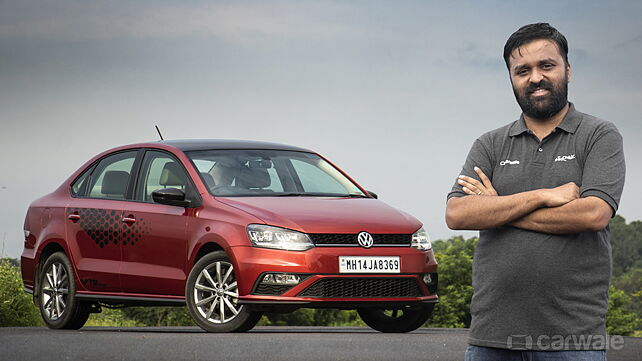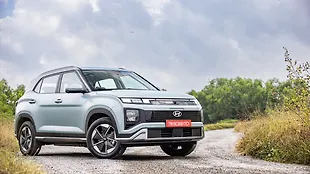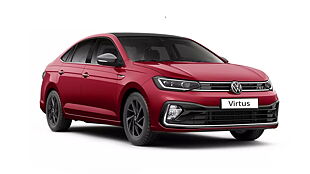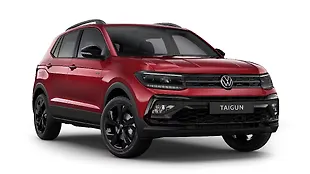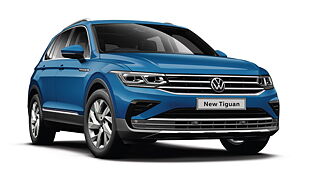Why I would buy it?
- Fun to drive
- Peppy petrol engine
Why I would avoid it?
- Ageing design
- Inadequate feature list
Verdict
The Volkswagen Vento has been around for a bit and in what it is known for- driving dynamics and engine performance- it still right up there, call it if you will, is a driver’s car. The Vento also still feels solidly built backing up the term German build quality. However, it’s from here that the road goes from tarmac to semi-paved path real fast. The exterior design has started to show its age while the quality of materials used in the cabin feels at least a generation behind when compared to the competition. It matches all the basic requirements of the segment in terms of features but not much else.

Engine and Performance
7.5 / 10

In the era of BS6, Volkswagen has left behind diesel and naturally aspirated petrol engines in favour of direct injection and in this case, a 1.0-litre TSI unit producing 109bhp/175Nm. It can be had with a six-speed automatic or a six-speed manual, the latter of which we have driven for this review. Put the car in first, ease off the throttle, and let the needle go past the 2000rpm mark and you will be greeted with a surprising wave of torque that’s linear and unrelenting to the 6000rpm redline. Keep the throttle pressed and you will hit three-digit speeds quick, a helpful feeling on the highway when you need to make your way around slower moving traffic.

The mid-range is strong with not much effort needed to get the best out of the six-speed gearbox to stay in the meat of the torque band. The gearshift actions are light but feel notchy and take some time to get used to in terms of muscle memory.

It’s not a particularly refined engine and during idle you can hear and feel the thrum associated with three-pot motors. On the go, it is quite vocal if you rev it hard but with so much action available so easily and constantly, you would be busier paying attention to the road rather than the engine note.

As a replacement for the 1.6-litre four-cylinder petrol as well as the 1.5-litre diesel in VW’s range the 1.0-litre TSI certainly feels more than adequate. In a car with better NVH insulation, we expect it to hum away quietly in the background while doing its thing. This engine is offered with the Polo hatchback and is also expected to power certain versions of the upcoming Taigun SUV.

The big question now is fuel efficiency which Volkswagen claims an ARAI figure of 17.69kmpl. We will be able to give you real-world figures once we have fully tested the car.
Ride and handling
6.5 / 10

In a growing world of SUV and SUV styled vehicles the driving experience a sedan offers is always an experience in its own and in that regard the Vento has always been a driver’s car among its peers. VW has managed to find a good balance between comfort and handling and that bodes well for the Vento. The steering has a certain heft to it which feels reassuring both when you are attacking corners or having to navigate your way around massive potholes, craters, and everything in between. It’s quite accurate for a car in this class and size but like its sibling the Skoda Rapid, it needs two-and-a-three quarter turns to go from lock-to-lock. This is something that becomes quite evident when you need to make a U-turn or park in a tight space.

The ride quality is on the firmer side at low speeds and this makes things noticeably bumpy if you are tackling bad roads. But go faster and the Vento comes into its own and takes everything in its path without much of a struggle. The smaller bumps and imperfections are done dusted without sending much back into the cabin. This firm(er) ride quality also means the car displays a good level of poise and composure if you want to drive enthusiastically. It’s best to plan your moves and take advantage of the 1.0-litre TSI unit’s rev-happy nature to keep your pace constant.
Interior space and quality
5.9 / 10

The Vento was the first car that VW developed and brought to India when it began operations here in the previous decade. It’s survived in that same avatar with regular updates over the years to keep it fresh. While that had worked well for a while, it’s started to show its age in terms of quality especially when looked at against the competition. The cabin is a black and beige affair with hard-wearing plastics across most of the surfaces.

It’s a similar story with the upholstery (also beige) as well as most of the other plastics across the cabin. The centre console stands out due to its silver frame while the steering gets glossy inserts and flat bottom design, a saving grace in what is otherwise a lacklustre front part of the cabin. However, the beige tone helps in uplifting the cabin and gives it an airy feel.

Space in the second row is adequate for two in comfort as the middle occupant will have to contend with a transmission tunnel and the rear AC vents eating into legroom and knee room. It could, however, do with more under-thigh support and more cushioning for the seat base. The Vento, is behind all its rivals in terms of dimensions but sitting in the car it hardly feels that way as you have a decent amount of headroom and shoulder room. One ace up the Vento’s sleeve is that it feels solidly built with everything well put together befitting the adage ‘German build quality’. One place where you can see this is when you open and close the doors both of which are achieved with a reassuring thud.
Features and safety
5.5 / 10

The car that we have driven is a top-of-the-line Highline Plus model kitted out with everything available in the Vento’s arsenal. You get climate control, cruise control, rear AC vents, two 12V sockets and height adjustment for the steering wheel as well as the driver’s seat. The highlight of the centre console is a touchscreen infotainment system with Apple CarPlay and Android Auto. We have evaluated this system in detail in a touchscreen test we performed last year and you can read about that here. All versions of the Vento are offered with dual front airbags, ABS with EBD, and rear parking sensors. Also, our Highline Plus test car further gets LED headlamps and a reverse parking camera.
Conclusion
6.4 / 10

The Volkswagen Vento may have fallen behind its rivals in terms of generation but that’s certainly not dampened its ability to put a smile on your face when you drive it, one of its key selling points. However, that is outweighed by its lacklustre interiors, ageing exterior design, and inadequate feature list.

The Volkswagen Vento range is priced from Rs 10.32 lakh to Rs 14.02 lakh (on-road Delhi) the latter of which is the cost of this top-of-the-line Highline Plus MT model that we have reviewed. There are also two AT versions in the Highline and Highline Plus trim which are priced at Rs 14.06 lakh and Rs 15.43 lakh (on-road Delhi) respectively.

